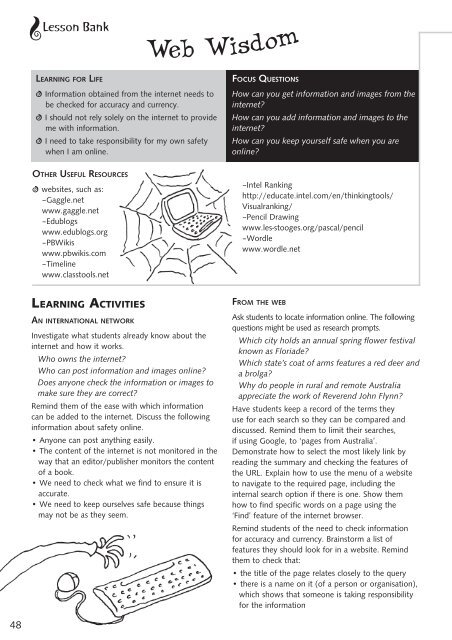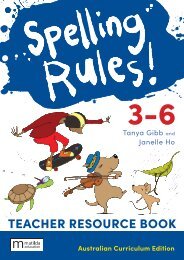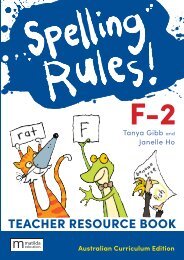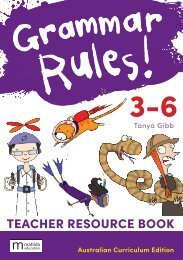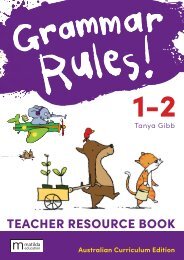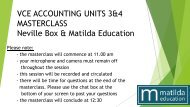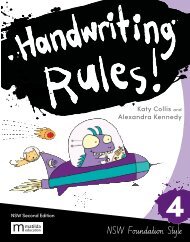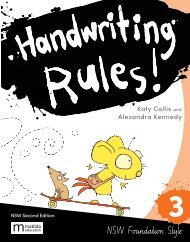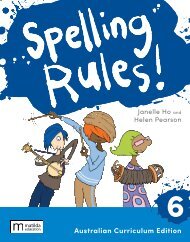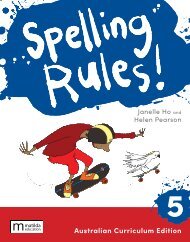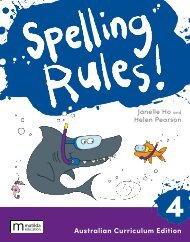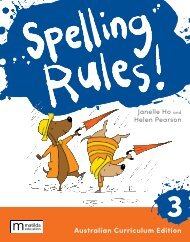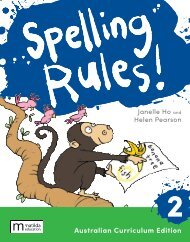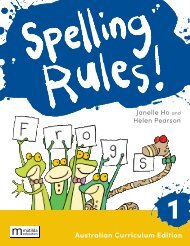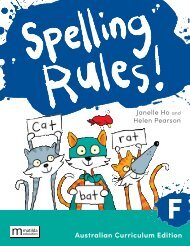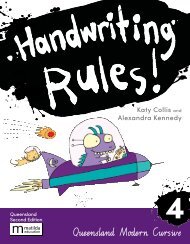All You Need to Teach - Info Literacy 10+
Create successful ePaper yourself
Turn your PDF publications into a flip-book with our unique Google optimized e-Paper software.
Lesson Bank<br />
Web Wisdom<br />
Learning for Life<br />
V <strong>Info</strong>rmation obtained from the internet needs <strong>to</strong><br />
be checked for accuracy and currency.<br />
V I should not rely solely on the internet <strong>to</strong> provide<br />
me with information.<br />
V I need <strong>to</strong> take responsibility for my own safety<br />
when I am online.<br />
Focus Questions<br />
How can you get information and images from the<br />
internet?<br />
How can you add information and images <strong>to</strong> the<br />
internet?<br />
How can you keep yourself safe when you are<br />
online?<br />
Other Useful Resources<br />
V websites, such as:<br />
–Gaggle.net<br />
www.gaggle.net<br />
–Edublogs<br />
www.edublogs.org<br />
–PBWikis<br />
www.pbwikis.com<br />
–Timeline<br />
www.class<strong>to</strong>ols.net<br />
–Intel Ranking<br />
http://educate.intel.com/en/thinking<strong>to</strong>ols/<br />
Visualranking/<br />
–Pencil Drawing<br />
www.les-s<strong>to</strong>oges.org/pascal/pencil<br />
–Wordle<br />
www.wordle.net<br />
Learning Activities<br />
An international network<br />
Investigate what students already know about the<br />
internet and how it works.<br />
Who owns the internet?<br />
Who can post information and images online?<br />
Does anyone check the information or images <strong>to</strong><br />
make sure they are correct?<br />
Remind them of the ease with which information<br />
can be added <strong>to</strong> the internet. Discuss the following<br />
information about safety online.<br />
• Anyone can post anything easily.<br />
• The content of the internet is not moni<strong>to</strong>red in the<br />
way that an edi<strong>to</strong>r/publisher moni<strong>to</strong>rs the content<br />
of a book.<br />
• We need <strong>to</strong> check what we find <strong>to</strong> ensure it is<br />
accurate.<br />
• We need <strong>to</strong> keep ourselves safe because things<br />
may not be as they seem.<br />
From the web<br />
Ask students <strong>to</strong> locate information online. The following<br />
questions might be used as research prompts.<br />
Which city holds an annual spring flower festival<br />
known as Floriade?<br />
Which state’s coat of arms features a red deer and<br />
a brolga?<br />
Why do people in rural and remote Australia<br />
appreciate the work of Reverend John Flynn?<br />
Have students keep a record of the terms they<br />
use for each search so they can be compared and<br />
discussed. Remind them <strong>to</strong> limit their searches,<br />
if using Google, <strong>to</strong> ‘pages from Australia’.<br />
Demonstrate how <strong>to</strong> select the most likely link by<br />
reading the summary and checking the features of<br />
the URL. Explain how <strong>to</strong> use the menu of a website<br />
<strong>to</strong> navigate <strong>to</strong> the required page, including the<br />
internal search option if there is one. Show them<br />
how <strong>to</strong> find specific words on a page using the<br />
‘Find’ feature of the internet browser.<br />
Remind students of the need <strong>to</strong> check information<br />
for accuracy and currency. Brains<strong>to</strong>rm a list of<br />
features they should look for in a website. Remind<br />
them <strong>to</strong> check that:<br />
• the title of the page relates closely <strong>to</strong> the query<br />
• there is a name on it (of a person or organisation),<br />
which shows that someone is taking responsibility<br />
for the information<br />
48


